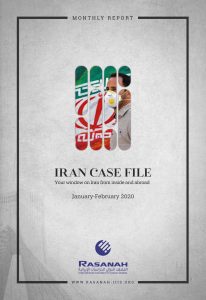The International Institute for Iranian Studies (Rasanah) has issued its ‘Iran Case File’ for January and February which provides readers interested in Iranian affairs a comprehensive review and an in-depth analysis of Iran. The report is divided into three main parts: Internal Affairs, Arab Affairs and International Affairs.
Internal Affairs: At the ideological level, the response of clerics to the coronavirus outbreak  sparked a great deal of controversy among the religious elite and Iranian society in general. The coronavirus outbreak began in the city of Qom where the religious seminary is headquartered. Over the past few years, Iran has been keen to welcome Chinese Muslims within the seminary to create a Shiite faction in China. The normal step would have been to quarantine the city, but clerics strongly rejected this step, citing religious and metaphysical justifications such as holy shrines having the ability to cure diseases.
sparked a great deal of controversy among the religious elite and Iranian society in general. The coronavirus outbreak began in the city of Qom where the religious seminary is headquartered. Over the past few years, Iran has been keen to welcome Chinese Muslims within the seminary to create a Shiite faction in China. The normal step would have been to quarantine the city, but clerics strongly rejected this step, citing religious and metaphysical justifications such as holy shrines having the ability to cure diseases.
At the political level, Iranian authorities have intervened to the highest degree to hijack the will of the people via the Guardian Council which prevented nearly all those described as moderates and reformists from running for Parliament.
At the economic level, the report discusses two important issues. The first is the serious consequences of the FATF’s blacklisting of Iran. The second issue is the spread of coronavirus and its possible implications.
At the military level, Iran was dealt a tremendous blow with the assassination of Quds Force Commander Qassem Soleimani by the United States, a move that brought Iranian schemes in Iraq to a halt and curbed Iran-backed militias deployed in the region.
The Arab regions neighboring Iran witnessed two developments that impacted the Iranian presence in Syria and Iraq. After Iran sought to make Iraq an arena for its dispute with the United States by targeting the US embassy headquarters and shelling US bases in Iraq, the killing of Qassem Soleimani earlier in the year came as a differentiating point between Iranian actions before the killing of Soleimani and those after it. The Syrian arena was no less fragile than the Iraqi arena for Iran. The battles which broke out between the Ankara-backed Syrian opposition factions and Bashar al-Assad’s forces thrust Iran into a difficult balancing equation as Turkish forces entered Syrian territories to directly engage in conflict. The Assad government backed by Iran needs Turkey economically given the huge trade exchange between them which mitigates the impact of US sanctions.
At the international level, it could be said that January and February witnessed a great deal of deterrence by Iran. Despite Iran attacking oil tankers, and Tehran threatening navigation routes (the Arabian Gulf, the Gulf of Oman and the Red Sea), as well as targeting oil facilities in Saudi Arabia, and carrying out attacks on the diplomatic headquarters of the United States in Iraq since 2019, it is fair to say that relations between the United States and Iran worsened dramatically after the death of Soleimani. Iran is no longer capable of taking action without fearing powerful counter-responses against it. Therefore, this curbed pro-Iran militias.
